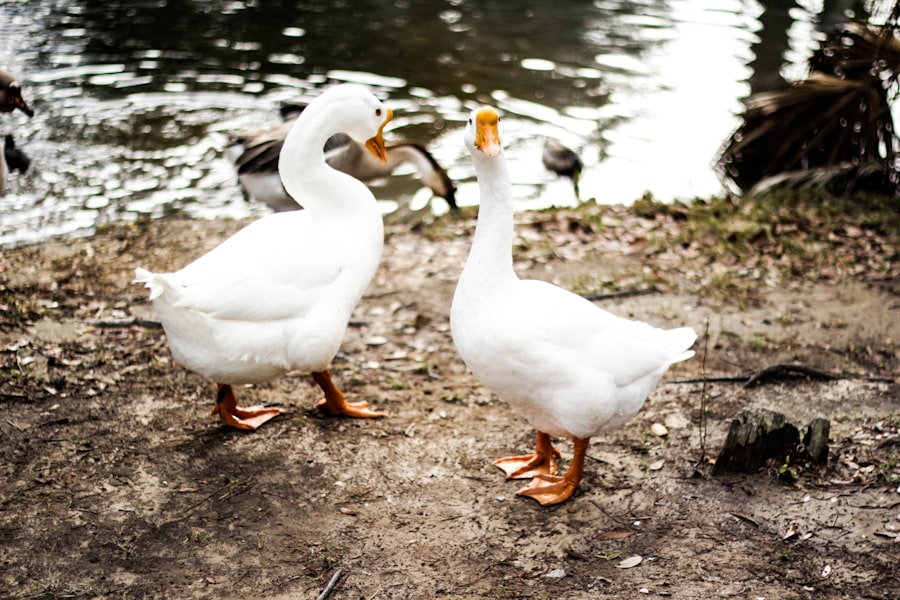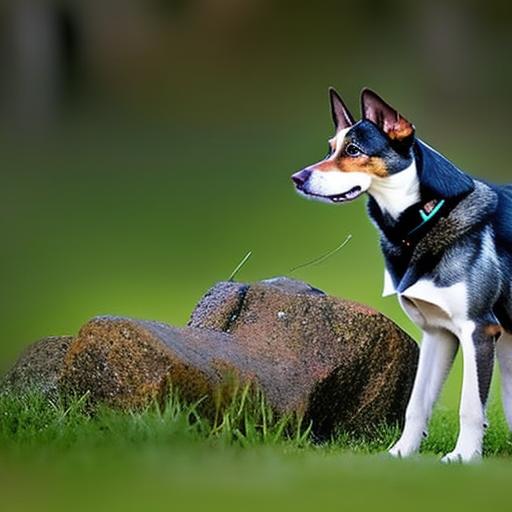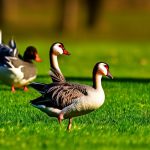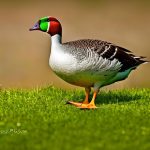Geese control dogs are specially trained canines that are used to keep geese away from certain areas. Geese can be a nuisance in many settings, including parks, golf courses, and agricultural fields. They can cause damage to property, create safety hazards, and contaminate water sources. Geese control dogs are trained to chase and harass geese, effectively discouraging them from settling in unwanted areas.
Key Takeaways
- Geese control dogs are trained to keep geese away from certain areas.
- Using dogs for geese control is a humane and effective method.
- Different breeds of dogs are used for geese control, including Border Collies and Labrador Retrievers.
- Training geese control dogs involves teaching them basic obedience and specific geese control techniques.
- Effective techniques for using geese control dogs include using them in pairs and rotating their work schedules.
Benefits of Using Dogs to Keep Geese Away
One of the main benefits of using geese control dogs is the reduced damage to property. Geese can cause significant damage to lawns, crops, and golf courses with their constant grazing and droppings. By using dogs to keep geese away, property owners can save money on repairs and maintenance.
Another benefit is improved safety for humans and other animals. Geese can become aggressive when they feel threatened, especially during nesting season. They may attack humans or other animals that come too close to their nests. Geese control dogs can help prevent these confrontations by keeping geese at a safe distance.
Using geese control dogs is also cost-effective compared to other methods. Traditional methods of geese control, such as using noise makers or chemical deterrents, can be expensive and may not always be effective. Geese control dogs provide a natural and efficient solution that requires minimal ongoing costs.
Types of Dogs Used for Geese Control
There are several breeds that are commonly used for geese control. Border Collies are one of the most popular breeds due to their intelligence and herding instincts. They are highly trainable and excel at chasing and herding geese.
Other breeds that are commonly used include Australian Shepherds, Labrador Retrievers, and German Shepherds. These breeds also have strong herding instincts and are known for their intelligence and obedience.
The characteristics that make these breeds effective for geese control include their high energy levels, intelligence, and natural herding instincts. These traits allow them to quickly learn and execute the necessary commands to effectively chase and harass geese.
The Training Process for Geese Control Dogs
The training process for geese control dogs typically involves several stages. It begins with basic obedience training, which includes commands such as sit, stay, and come. This foundation is important for ensuring that the dog can be controlled in various situations.
Once the dog has mastered basic obedience, it can move on to more specialized training for geese control. This includes teaching the dog to chase and harass geese without causing harm. The dog is trained to respond to specific commands and cues that indicate when it should chase or back off.
Socialization is also an important aspect of training. Dogs need to be comfortable around people, other animals, and different environments in order to be effective in their role as geese control dogs. This involves exposing the dog to various social situations and environments from a young age.
Effective Techniques for Using Geese Control Dogs
To properly use geese control dogs, it is important to understand their role and limitations. Dogs should be used as a deterrent rather than a means of physically harming or capturing geese. The goal is to create an environment that is uncomfortable for geese, causing them to seek out alternative locations.
One effective technique is to use the dog’s presence alone as a deterrent. Geese are naturally wary of predators, so simply having a dog in the area can be enough to keep them away. Regular patrols by the dog can help reinforce this deterrent effect.
Another technique is to use the dog’s herding instincts to chase and harass geese. This can be done by giving the dog specific commands or cues to indicate when it should chase or back off. The goal is to create a sense of unpredictability for the geese, making them feel unsafe and encouraging them to leave the area.
To maximize the effectiveness of geese control dogs, it is important to vary their routine and use them at different times of the day. Geese can become accustomed to the presence of a dog if they see it consistently at the same time. By varying the dog’s schedule, it keeps the geese on edge and less likely to settle in the area.
The Role of Geese Control Dogs in Agriculture

Geese control is particularly important in agriculture, where geese can cause significant damage to crops. They can eat or trample on young plants, reducing yields and causing financial losses for farmers. Geese control dogs can help protect crops by keeping geese away from agricultural fields.
Geese control dogs are trained to patrol fields and chase away geese that attempt to land or feed on crops. Their presence alone can be enough to deter geese from settling in the area. This helps farmers reduce crop damage and maintain higher yields.
In addition to protecting crops, geese control dogs can also help farmers manage other wildlife issues. For example, they can be trained to chase away other pests such as rabbits or deer that may also cause damage to crops. This makes geese control dogs a versatile tool for farmers.
The Importance of Geese Control in Urban Areas
Geese can also be a problem in urban areas, where they often congregate in parks, golf courses, and residential areas. Their droppings can create unsightly messes and pose health risks due to bacteria and parasites. Geese control dogs can help mitigate these problems by keeping geese away from these areas.
In parks and recreational areas, geese control dogs can help maintain a clean and safe environment for visitors. By patrolling these areas regularly, they discourage geese from settling and leaving behind droppings. This improves the overall experience for park-goers and reduces the risk of disease transmission.
In residential areas, geese control dogs can help prevent damage to lawns and gardens. Geese can cause significant damage to grass and plants with their constant grazing. By keeping geese away, dogs can help homeowners maintain their property and reduce the need for costly repairs.
The Advantages of Using Geese Control Dogs over Other Methods
Compared to other geese control methods, using dogs has several advantages. One advantage is that dogs provide a natural and non-lethal solution. They use their natural instincts to deter geese, rather than relying on noise makers or chemical deterrents that may be harmful to the environment or other animals.
Another advantage is the flexibility and mobility of geese control dogs. They can be easily deployed to different areas as needed, making them a versatile tool for geese control. This is particularly beneficial in agricultural settings where crops may be spread out over large areas.
Geese control dogs also have the advantage of being highly trainable and responsive to commands. This allows handlers to have greater control over their actions and ensures that they can be used effectively in various situations. Dogs can be trained to respond to specific cues or commands that indicate when they should chase or back off.
Common Challenges in Geese Control Dog Training
Training geese control dogs can come with its own set of challenges. One common issue is distraction, as dogs may be tempted to chase other animals or become overly excited in certain environments. This can be addressed through consistent training and reinforcement of commands.
Another challenge is ensuring that the dog remains focused on its task and does not become bored or disinterested. This can be overcome by providing regular mental and physical stimulation for the dog, such as through playtime or training sessions.
Some dogs may also have a natural aversion or fear of water, which can make it difficult to train them for geese control in areas with water sources. This can be addressed through gradual exposure and positive reinforcement to help the dog overcome its fear.
The Future of Geese Control Dogs
Geese control dogs have proven to be an effective and natural solution for keeping geese away from unwanted areas. Their ability to deter geese without causing harm makes them a preferred method for many property owners and farmers.
As the awareness of the benefits of geese control dogs continues to grow, it is likely that their use will increase in the future. Their versatility and effectiveness make them a valuable tool for managing geese populations in various settings.
By utilizing geese control dogs, property owners can reduce damage to their property, improve safety, and save money on costly repairs. Farmers can protect their crops and increase yields, while urban areas can maintain clean and safe environments for residents and visitors.
Overall, geese control dogs offer a natural and efficient solution to the problem of geese in various settings. With proper training and management, they can help mitigate the negative impact of geese and create a more harmonious coexistence between humans and wildlife.
If you’re looking for ways to improve your chicken coop and keep your feathered friends happy and safe, you might be interested in this article on turning a shed into a chicken coop. But did you know that dogs can also play a role in maintaining a peaceful and clean coop environment? Check out this fascinating article on how dogs trained to keep geese away can be a valuable asset to your poultry operation. (source)
Meet Walter, the feathered-friend fanatic of Florida! Nestled in the sunshine state, Walter struts through life with his feathered companions, clucking his way to happiness. With a coop that’s fancier than a five-star hotel, he’s the Don Juan of the chicken world. When he’s not teaching his hens to do the cha-cha, you’ll find him in a heated debate with his prized rooster, Sir Clucks-a-Lot. Walter’s poultry passion is no yolk; he’s the sunny-side-up guy you never knew you needed in your flock of friends!







